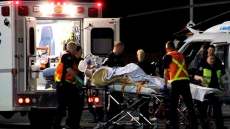EDMONTON — Voters are heading to the polls in the Alberta election today and advance turnouts suggest it could be busy at the ballot boxes.
Almost 700,000 people voted early in malls, airports, recreation centres, public buildings and even an Ikea store. That was well ahead of the 235,000 who came out early in the 2015 election that saw Rachel Notley's NDP deliver a surprise knockout blow to the 44-year run of the Progressive Conservatives.
This time around, the Progressive Conservatives are no more.
The PCs merged with another right-centre party, the Wildrose, to create the new United Conservatives under former federal cabinet minister Jason Kenney.
Take some time in your day to exercise your democratic right #Alberta!#vote pic.twitter.com/e5StEnAkxc
— Joelle Tomlinson (@CTVJoelle) April 16, 2019
The four-week campaign focused on personal attacks and on Alberta's fragile economy, which has been struggling for several years with sluggish oil prices and unemployment levels above seven per cent in Calgary and Edmonton.
Kenney has argued that Notley's government has made a bad situation worse with higher taxes, more regulations and increases in minimum wage.
Today I was asked whether I'm spending too much time on Justin Trudeau and the Notley-Trudeau alliance.
— Jason Kenney (@jkenney) April 15, 2019
I make no apologies for standing up to Justin Trudeau and supporting Andrew Scheer. It is in Alberta's vital interest to see Justin Trudeau defeated this fall. pic.twitter.com/f7ugoLgBb8
Notley, in turn, has said Kenney's plan to freeze spending and pursue more private-care options in health care will have a profound impact on students in the classroom and on patients waiting for care.
The campaign also featured Alberta's relationship with Ottawa, specifically Prime Minister Justin Trudeau.
Notley said her success working with Trudeau — or picking her fights with him as necessary — is what led to progress on the Trans Mountain pipeline expansion to the B.C. coast. She expects construction to begin this year.
"Ignoring this stuff means you're complicit in this stuff," said @nenshi of candidates making hateful comments ahead of the Alberta election.#ctvpp #cdnpoli
— CTV Power Play (@CTV_PowerPlay) April 15, 2019
More at https://t.co/uCQmGSpNgb pic.twitter.com/sZ9LuJYWmW
She said Kenney's promise to challenge Trudeau in court on everything from the federal carbon tax to proposed energy industry rule changes is cynical, self-defeating shadow-boxing given the collaborative realities of political decision-making.
Kenney has campaigned on the "Trudeau-Notley alliance" that he says has turned Alberta into a doormat for Trudeau and other oil industry foes with no more than a faint and as yet unrealized promise of one pipeline expansion to the coast.
Notley has also tried to make Kenney's character an issue. A number of his candidates have either quit or apologized for past comments that were anti-LGBTQ, anti-Islamic or sympathetic to white nationalism.
April 16th has arrived. Let's do this Alberta. #abelection @GlobalCalgary pic.twitter.com/sCcENAar2h
— Sarah Offin (@sarahoffin) April 16, 2019
Kenney has called the attacks a "fear-and-smear" red herring to distract from the NDP's economic track record of multibillion-dollar budget deficits and soaring debt.
On the political fringes are the Alberta Party and the Liberals, each of which elected one candidate to the legislature in 2015.
The Alberta Party, led by former Edmonton mayor Stephen Mandel, is running a full slate of candidates. It's promising to be the safe centrist middle ground by combining the economic conservatism of the UCP with the social progressivism of the NDP.
The Liberals, led by lawyer David Khan, are running on a similar platform with one significant exception — a provincial sales tax.
History will be made no matter what.
Notley will either be the first Alberta NDP premier to win re-election or the first leader in the province to fail to win a renewed mandate on the first try.
Since its creation in 1905, Alberta has elected multi-term dynasties: the Liberals (1905-1921), the United Farmers of Alberta (1921-1935), the Social Credit (1935-1971) and the Progressive Conservatives from 1971 to 2015.

